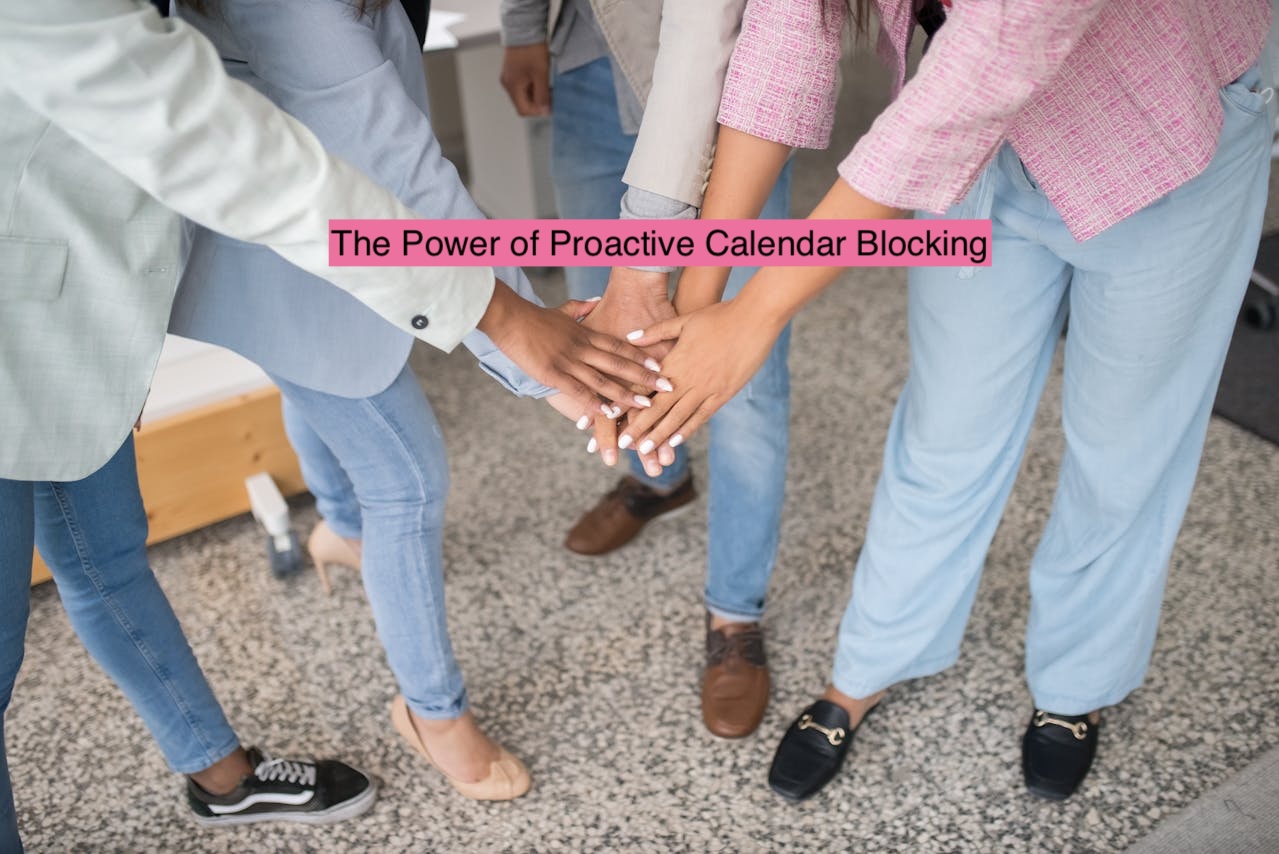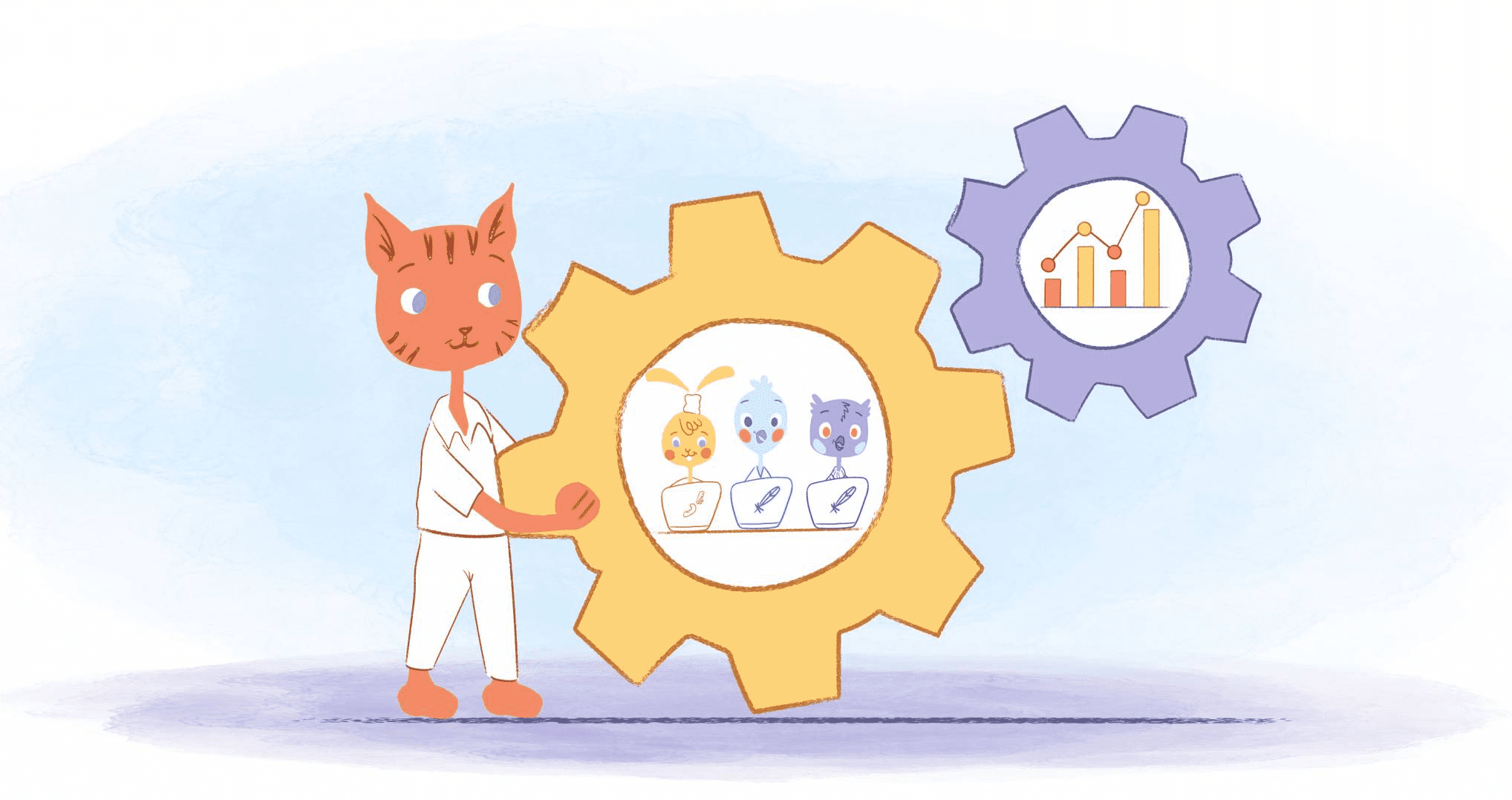

Many of us feel like our calendars are filled with an endless to-do list. After all, calendars are typically used reactively — with meetings, appointments, and last-minute tasks taken care of, then everything else squeezed in around them. The result? Constant busyness, fragmented focus, and a feeling that you’re working hard but not making progress.
Wouldn’t it be better if your calendar served you rather than vice versa?
With proactive calendar blocking, you can take charge of your time, attention, and energy. Rather than just recording obligations, this strategy allows you to design your day around what is most important. The goal isn’t to do more. It’s about doing what matters — intentionally.
From Reactive to Proactive: Why it Matters
In a reactive calendar, your day is shaped by external factors, like meetings, messages, and other people’s emergencies. When you’re constantly switching gears, deep work gets pushed to “someday.” It’s like trying to write a novel during commercial breaks while watching your favorite show.
Proactive calendars flip that script. By reserving time beforehand, you avoid being overburdened. You protect time for your deep work, personal priorities, and even rest. Instead of going from scene to scene, you become the director of your day.
In short, when you stop reacting and start directing, the shift is profound.
The Five Steps to Mastering Proactive Calendar Blocking
While adopting this strategy is a deliberate process, it pays off in terms of clarity, focus, and reduced stress. Here’s how it can be implemented effectively;
Step 1: Identify your peak productivity hours.
Each of us has a window of peak energy and focus. It’s early in the morning for some. Other people find it mid-afternoon. Effective calendar blocking begins with knowing these hours.
They can be identified by;
- Over a week, track your energy and focus.
- Take a look back at when you’ve done your best work.
- Observe when you’re “in the zone.”
As soon as these hours are identified, guard them fiercely. You can use them for tasks that require deep concentration, such as strategic thinking, writing, and planning. Don’t waste them on email or admin work. Don’t let these golden hours slip by. Instead, treat them like sacred appointments.
Step 2: Create focus blocks for deep work.
In most cases, deep work does not happen by accident. When you live in a world of notifications and meetings, you have to make space for it.
During focus blocks, time is scheduled for uninterrupted, high-impact work. It signals to others and yourself that meaningful progress is being made.
Here are the best practices;
- Make sure they coincide with your peak hours.
- Ultradian rhythms occur throughout the day, usually every 90 minutes, so 30-60 minutes is a good start, followed by 25-minute Pomodoros and short breaks (5 minutes). For different types of focus and tasks, experimentation is key.
- Label blocks clearly, such as “Write the Q3 report,” not “Work.”
- Turn off notifications, close tabs, and wear headphones to reduce distractions.
You can transform your productivity by focusing on two solid blocks a day. Within a week, they accumulate into major gains.
Step 3: Block time for life, too.
You shouldn’t just use your calendar for work. Healthy living, relationships, hobbies, and rest are all part of a well-rounded schedule. Unless you block time for these, they’ll get pushed aside.
Here’s what you need to include;
- Exercise. Taking a short walk boosts mood and focus.
- Meals and breaks. Take a break from your desk to recharge.
- Personal admin. To avoid distractions, batch errands and tasks.
- Creative or learning time. Put hobbies and skill-building on your schedule as you would any other priority.
- End-of-day wind-down. Allow 15-30 minutes to plan tomorrow and disconnect.
By scheduling personal time with the same intention as meetings, you permit yourself to live more fully.
Step 4: Communicate your boundaries.
Protecting your time is just as crucial as blocking it. As a result, you need to set expectations with others.
Here’s how;
- Make your availability known to your team by sharing your calendar.
- Label blocks clearly, such as “Focus Time — Do Not Disturb.”
- Use chat statuses or autoresponders, like “In deep work until 11 AM, will reply after.”
- If an unnecessary meeting is necessary, decline it politely or suggest an alternative.
- Batch up your communications. Let others know you check messages at specific times, such as 11 AM and 3 PM.
You’re being clear, not difficult. Clear boundaries reduce misunderstandings, and boundaries create focus.
Step 5: Review and adjust weekly.
A proactive calendar blocking system is an ongoing process. By reviewing it weekly, you can keep it aligned with your goals, energy, and workload.
Every week;
- Take a moment to reflect on what worked well and what didn’t.
- What’s on tap for next week?
- Don’t add anything else until you’ve blocked out time for priorities.
- Determine if there are any overloads or pinch points.
- During low energy periods, take more breaks or add more focus time before big deadlines.
A weekly review, ideal on Friday afternoons or Sunday evenings, improves clarity and momentum.
The Mental Benefits of Owning Your Calendar
Taking control of your time doesn’t just mean getting more done; it means feeling better. “Too much busyness can be emotionally taxing. We may be too busy to attend to our needs, including our basic needs, like eating, sleeping, and social connection,” explains Caitlin Nevins, PhD, director of psychological services at McLean’s College Mental Health Program.
Here’s how proactive calendar blocking can help you;
Reduces decision fatigue.
Planning your priorities and tasks ahead of time eliminates mental exhaustion from constantly asking yourself, “What should I do next?”
Lowers stress and anxiety.
You’ll be less rushed, more in control, and less overwhelmed. By proactively carving out dedicated spaces for work, personal life, and rest, you are less likely to forget something crucial or run out of time.
Increases motivation and momentum.
With protected time, you’re more likely to accomplish your most important tasks. As a result of this consistent progress, a positive feedback loop is created, fueling your motivation and generating powerful momentum.
Improves work-life balance.
A healthy work-life balance requires dedicated time for personal activities, hobbies, and relaxation. Incorporating these elements into your calendar will help you avoid burnout and nurture your overall well-being.
Strengthens healthy routines and habits.
Consistent routines benefit mental and physical health. Your calendar can serve as a framework for building healthy habits, such as regular sleep schedules, exercise, and mindfulness practices. These habits contribute to improved mental well-being.
Supports mindful planning and reflection.
By reviewing your calendar regularly and reflecting on your progress, you will remain intentional about your time and goals. As your actions are aligned with your values, you can become more self-aware and more purposeful in your planning.
Fosters a sense of accomplishment.
With a record of your essential work, you won’t feel busy but unproductive at the end of the day. Seeing tangible evidence of progress builds self-efficacy and satisfaction.
Most importantly, you learn to design your time, rather than let it happen to you. Change like that is transformative.
Common Objections (and How to Overcome Them)
When adopting a new system like calendar blocking, you are likely to encounter some resistance, both internal and external. Here are some common objections and how to overcome them;
“My schedule changes constantly.”
That’s why calendar blocking is so helpful. In a chaotic environment, it provides much-needed structure. No matter what happens, you can move your blocks. Intention, not rigidity, is the key. Even when the timing changes, you stay focused on priorities. Instead of thinking of it as a concrete wall, think of it as a flexible framework.
“I feel guilty blocking time for myself.”
It’s time to flip the script on this internal narrative. The more rested, mentally fresh, deeply focused, and less reactive you are, the more effective you are. In the end, protecting your time for personal needs, deep work, and rejuvenation benefits everyone around you. Remember, this is an investment in your sustainability, not a luxury.
“My job doesn’t allow for that much control.”
Even if you cannot control your entire workday (e.g., if you have many mandatory meetings), you can almost always reclaim some time. You can begin small by allotting just one hour each day for focused work or personal time. Even 30 minutes of intentional, uninterrupted time can make a big difference. With time, as your focused approach demonstrates its benefits, you may gain more flexibility.
Final Thoughts: Time Is a Design Problem
You don’t need more hours in the day. To make the most of the hours you already have, you need a better strategy. Using a calendar block isn’t about micromanaging your life, but about designing it around your priorities.
By controlling your schedule instead of reacting to it, you reclaim more than time. As a result, you regain your focus, your energy, and your sense of purpose.
Image Credit: Ivan Samkov; Pexels











John Hall
John Hall is the co-founder of Calendar a scheduling and time management app. He’s also a keynote speaker that you can book at http://www.johnhallspeaking.com.